Ask a question from expert
Services for Health and Social Care or children and young people
28 Pages9339 Words447 Views
Added on 2021-01-01
Services for Health and Social Care or children and young people
Added on 2021-01-01
BookmarkShareRelated Documents
Undertake a research project within Services for Health and Social Care or Children and Young People (Unit reference number: J/602/3499)Unit AimsThe purpose of this unit is to enable you to demonstrate that you have the knowledge, skills and understanding to undertake a research project in Services for Health and Social Care or Children and Young People. This guidance will help you to set out and develop your project so that you cover all the steps required to achieve the unit.Learning OutcomesBe able to justify a topic for research within services for health and social care or children and young peopleUnderstand how the components of research are used Be able to conduct a research project within services for health and social care or children and young peopleBe able to analyse research findings Sources of informationHere are some sources of information which you may find useful: Books G. Wisker - The Postgraduate Research Handbook ISBN 9780230521308C. Robson - How to do a research project: A guide for undergraduates ISBN 9781405114905Websiteswww.angelfire.com/biz/rumsby/ARES.html- how to do researchwww.enquirylearning.net/ELU/Issues/Research/Res1Cont.html - an introduction to qualitative researchwww2.chass.ncsu.edu/garson/pa765/survey.htm - a guide to survey researchwww.enquirylearning.net/ELU/Issues/Research/Res1Ch4.html - an introduction to actionresearchwww.nova.edu/ssss/QR/QR3-2/tellis1.html - a guide to case study researchyou may complete this workbook and present it in total as your evidence or you can submit the tasks as completed to your assessor for assessment and feedback as you progress.Your assessor may request which approach they wish you to use for them
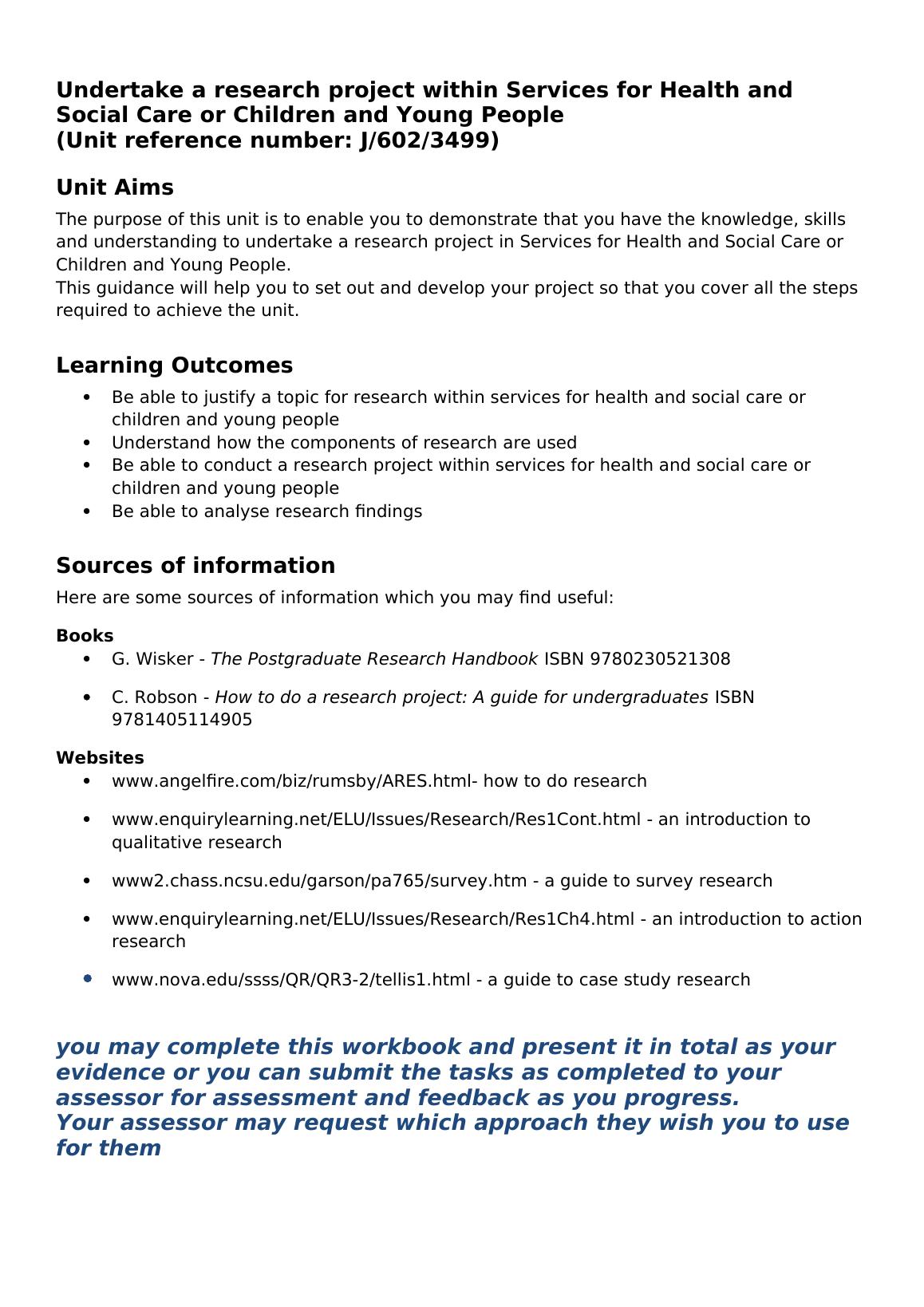
Undertake a research projectLet's start with some fundamentals.Firstly, you need to consider what is to be the focus of your research project and to develop its aims and objectives relating to health and social care or children and young people. This may be something which has interested you for some time, or it may be an issue which is topical. For example, you might want to try and establish to what extent your service is delivering personalised experiences to individuals and their families. By doing this you will try to prove that delivering high quality services to vulnerable individuals combines safe, effective, caring, responsiveness and well led attributes that meet the inspection criteria.Research projects usually fit into one of four categories of research:positivist/post positivist (mainly quantitative)social constructivist (mainly qualitative)pragmaticparticipatory Researchers have different world views or belief systems which guide them in their research, influencing the decisions they make about how to conduct their studies, what counts as valid knowledge, what is the right way to obtain that knowledge, how it should be analysed (e.g. using quantitative or qualitative-based methods) and what their own role in the process is.The post-positivist tradition emerged in the 19th century. They challenged the positivist attempts to seek “absolute truth” arguing that this was not appropriate when studying the behaviour and actions of people. This led to an acceptance that absolute truth can never be found and that research evidence is not infallible or perfect. According to the social constructivist paradigm, people try to make sense of the world theylive in. Through interaction with other people, they develop subjective understandings and meanings of their experience and they do this within a specific social, political, cultural and historical context. Social constructivists believe that there is not one reality but rather varied and multiple realities. Based on this theory of reality, researchers are interested in trying to understand the way people experience and make sense of the world.Compatibility theory acknowledged the different philosophical assumptions but stated that each approach had its strengths and weaknesses, that neither was right or wrong and that methods typically used by each could even be mixed in the same study. This is known as the pragmatic paradigm and is generally accepted nowadays as being a valid approach to research.
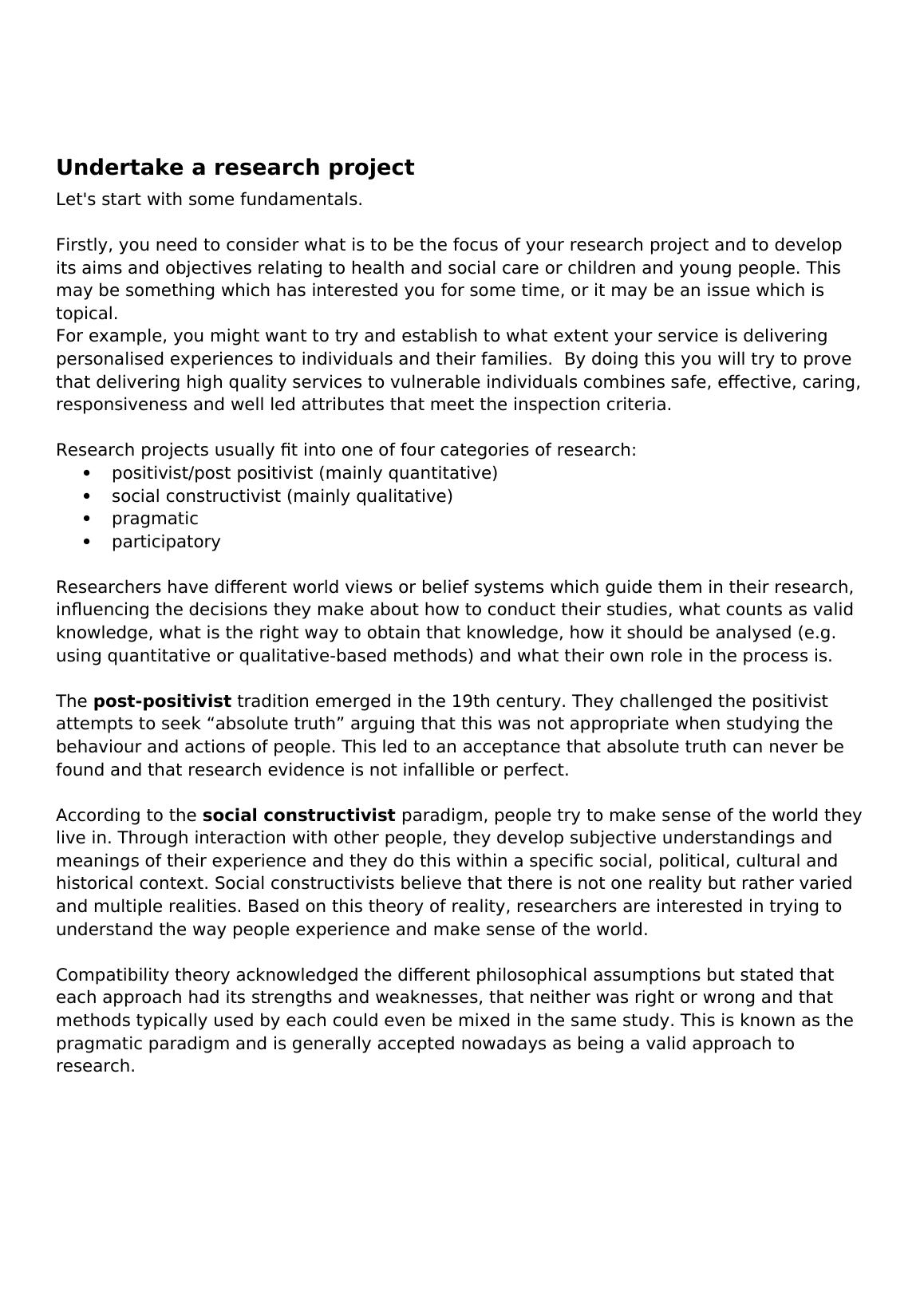
Once you have decided upon a possible area for research, you will need to consider a number of constraints or influences which might impact on this. For example:Are there any ethical considerations to take into account?What research methodologies will be most appropriate and effective for this project?What time or budgetary constraints are there which could impact on the research?Undertaking research, particularly in health and social care or children and young people, carries with it significant responsibilities both in terms of how the research is carried out and how the findings are used/published. Much, if not all, of the data you will use will be confidential and it is imperative that the rights of all individuals involved in the project are respected. As such you need to take into account any legal restrictions, for example confidentiality of information or sensitivity of protecting identity of participants that could impact on your research. You also need to be clear about the aims and objectives of the project:What is the purpose of the research?What do you hope to achieve?Taking the example of scrutinising your own service it is one of the best ways to learn about what things your team and you do right and what needs adjusting. In developing the aims andobjectives of the research it should help you to understand your service better but also to understand the needs of the individuals, their families, friends, advocates etc. The project should help you to put things more into practice and be more reflective of your actions. The research should help you to put things into perspective and find out different approaches, ideas from others, and how you can adapt those to your service if applicable.Finally, you will need a title for your research project!The title of my research project is:
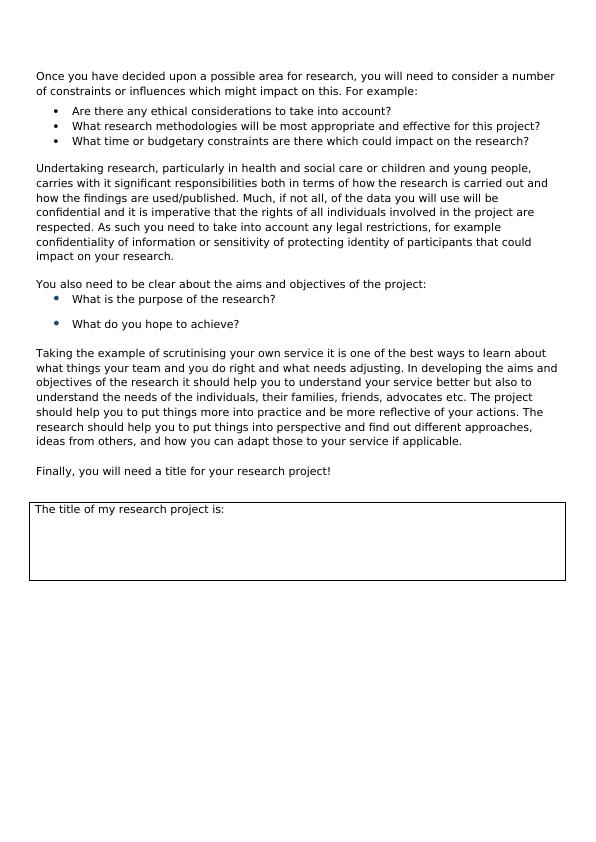
Task 1 Define and explain your research area, state what the aims and objectives of the project are and identify any ethical or other considerations inherent in the topic and the research methods to be used.My research area is: Diet and Exercise with young people, as nowadays nutrition and physicalfitness plays a key role in the health of adolescents. Physical activity and healthy diet has a directimpact on health of people from age of 13 to 21. The purpose of this research is to know theimportance of healthy diet and exercise among young people and promote physical activity acrossUK. The aims and objectives of the project are: The aim of this research proposal is to assess theimportance of exercise and healthy diet among young people of UK. Objectives To assess the importance of exercise among youth.To know the relevance of healthy diet among adolescents across UK. To promote healthy diet and physical activity among teens. Ethical considerations: ethics are considered as norms or standards for conduct that differentiatebetween right and wrong. Some ethical considerations that need to be followed while preparing forresearch proposal are; Voluntary participation, in which people are free to withdraw theirparticipation; do not harm, states that the evaluation process does not harm anyone; confidentiality,means does not allow access to information to anyone except coordinator. Your next step is to track down and examine the sources of information which will help with your research topic. These may be:web sitesjournalstext booksfilms/videos/documentariespresentationsother research papersThink about research looking across a wide range of literature relating to health and social care or children and young people. Perhaps you might include the findings of media and general public perception about the changes and progress through the years within the sector, if this is applicable, and perhaps consider some of the information and findings from fellow managers and their experiences, as well as attending service provider’s forums and relative seminars.
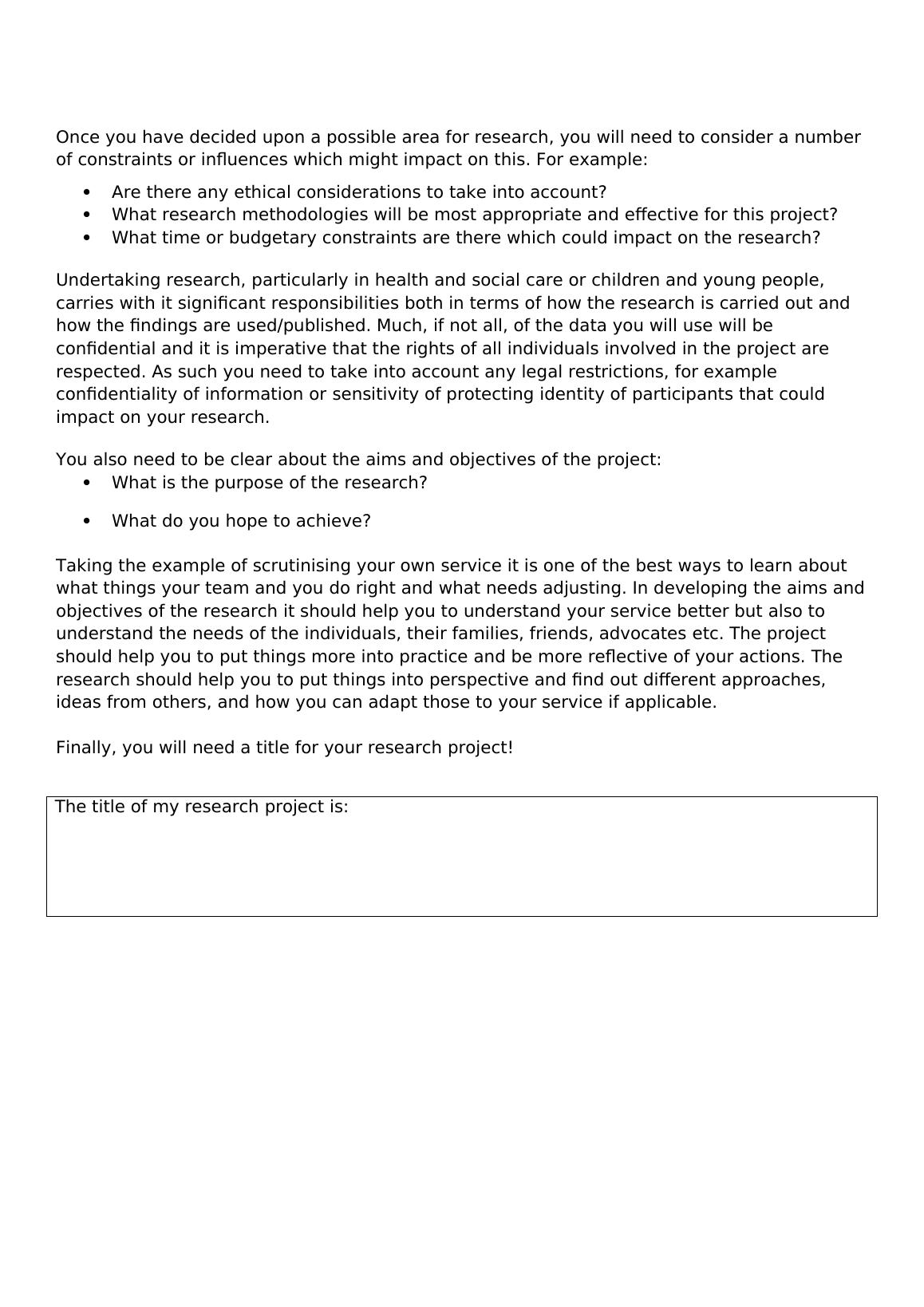
Task 2 Provide a summary of your literature review findings. As you find potential sources of information and opinion, make a note of the source, when it was published or originated and the author(s). Enter these in the space below or keep a spreadsheet with the details on.Physical activity has been related with a broad range of beneficial health results in young agepeople of UK. As per the views of Vissers, Hens and Taeymans, (2016), staying healthy isconsidered as the top and it should be the first priority in the list of youth generation. In addition,Salmoirago-Blotcher and Pbert, (2015) stated that the two major areas where younger people needthe most control are their diet and exercise. This is because, this can have a diverse impact on theoverall health and also can be some of the major factors in preventing disease in later life.According to Nourse, Olson and Tierney, (2015) , young people must do exercise for at-least twohours daily. As stated by Vissers, Hens and Taeymans, (2016) that youth is a generation in whichhaving a psychological need for consumption of a diet with good proteins is specifically essential.Kahkoska, Watts and Mayer-Davis, ( 2018 ),demonstrated that doing proper exercise and physicalactivity assists youth to develop healthy muscular tissues, to build a healthy cardiovascular system,improves movement control and maintains body weight. Moreover, supporting them, Riebl,Estabrooks and Davy, (2015) further added that health eating is also very essential for youngpeople because as they mature into adulthood, they may continue to eat those unhealthy fooditems, the habit that they have developed earlier. Therefore, according to Fedewa, Gist andDishman, (2014) , having healthy diet among youth of UK will maintain their healthy weight,which is considered as a vital part of overall good health. This is because overeating may result inhealth illness like type 2 diabetes, etc. Hence, good nutrition results in healthy lifestyle and if it iscombined with exercise, their diet can help them to maintain a weight and decrease risk of chronicdisease. From the perspective of Salmoirago-Blotcher and Pbert, (2015) , there are three key reasons topromote healthy diet & physical activity among young people of UK is; first to optimise presenthealth, growth and improvement; second to create healthy lifestyles that can be maintainedthroughout adulthood and to decrease the risk for chronic disease at the time of adulthood.Therefore, a health diet with physical activity has been related with the prevention of range ofhealth illness at the time of young age.According to Sekaran and Bougie, (2016) adolescents eating behaviours have come in the limelight
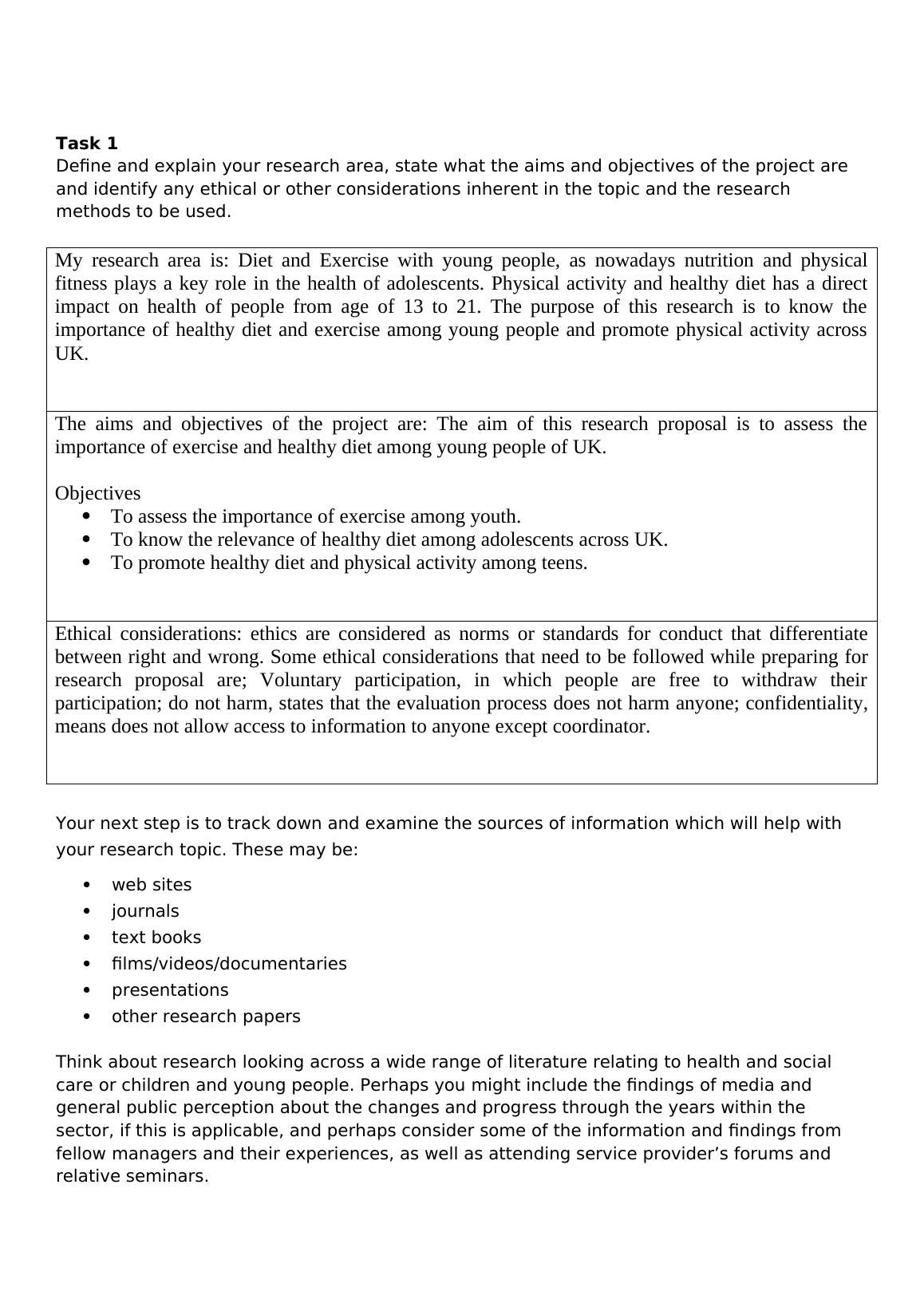
as of the unconventional meals, fast food intake and snacks. As everyone knows that adolescents isan important time which needs to be developed and maintain healthier diet. This has particularlygiven importance of necessary nutrients at this time of growth and development. A commonbehaviour which is being noticed among young age people is skipping of meal. It increasesthroughout adolescence as teens try to sleep longer in response to early school begin times, try tolose weight through restriction in calories and their life becomes engaged. Further, supporting them Kahkoska, Watts and Mayer-Davis, (2018) stated that status of adolescent'shealth and nutrition warrants special attention, as these young people are the future of this country.Over past few decades, UK has undergone significant changes and growth in economic factors.This has resulted in considerable changes in the lifestyle of UK and the country has one of thehighest rates of diet related non communicable disease such as obesity, cardiovascular anddiabetes in the world. Therefore, this change in lifestyle has influences on the health of youth inthe country. Research is generally divided into:the approach(s) usedthe data gathering and analysisOnce this stage is completed, the job of the researcher is to sift through the data, considering whether it is reliable and from a trusted source or authority, whether it is still current and whether it is authentic. There have been some famous or infamous cases where "research" has been published which ultimately turns out to be based on inaccurate or even false data. Finally, having considered all the data and information gathered, then the researcher proposes their findings, conclusions and judgements.So, let's start with deciding which approach you wish to use for your research. In order to decide on this, you will first need to establish what each method is.Listed below are some common research approaches:qualitativequantitativeexperimentalgroundedbasiccorrelationaldescriptiveethnographic
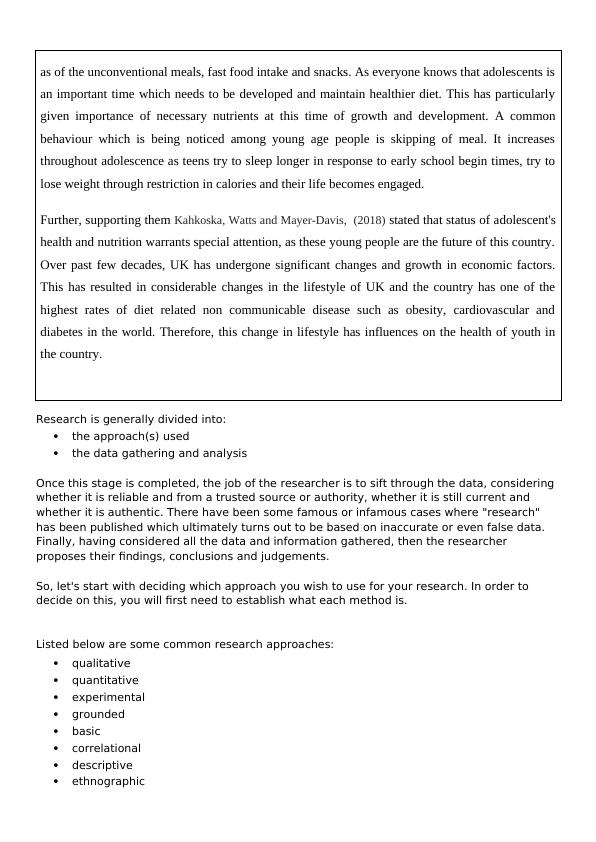
End of preview
Want to access all the pages? Upload your documents or become a member.
Related Documents
Working In Partnership In Health Care Assignmentlg...
|27
|9085
|222
Facilitating Change in Health and Social Care Assignmentlg...
|37
|11243
|580
Understand Safeguarding of People Working in Adult Sectorlg...
|7
|2639
|49
Report on Development of Practice in Health and Social Carelg...
|24
|10152
|179
Assessment Task 1 - questioninglg...
|21
|5101
|39
Report on Framework of Risk Managemen, Safety and Health in Workplacelg...
|21
|8791
|28